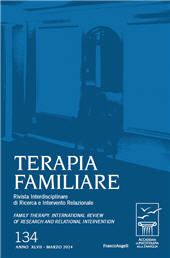Si sta come d'autunno sugli alberi le foglie : destrutturazione e ricostruzionesiva di un sistema terapeutico di fronte alla malattia degenerativa grave
17-32 p.
Nella specificità dell'incontro con famiglie che lottano con le dimensioni umane del morire, il T.F. si pone domande fondamentali con profonde implicazioni etiche: come e quando ricucire la scissione tra il tempo medico e i tempi psichici della famiglia? Come sostenere la libertà di scelta del singolo e del sistema quando queste non coincidono? Ogni perdita funzionale dettata dalla malattia richiede supplenti che devono potersi aggiungere: come e quanto la famiglia può integrali? Quanto e come usare il Sé del terapeuta che si confronta con continue perdite? Ha senso offrire la psicoterapia e quali dimensioni deve lavorare? Attraverso le continue riflessioni sui processi clinici condotti dall'équipe Lutto del Polo Clinico dell'Accademia di Psicoterapia della Famiglia di Roma, l'obiettivo del nostro lavoro è diventato individuare e rinsaldare gli elementi che sostengono i processi vitali della famiglia.
I temi del vivere e del morire costringono il sistema terapeutico a un continuo cambiamento adattivo; solo tollerando l'impotenza e restando disponibili ad apprendere da questa dolorosa esperienza, il limite destrutturante può diventare occasione per ricostruire nuovi modi di comunicare, di stare, di vivere. Ricostruire sulle relazioni, cercare e fortificare le risorse integre, il lavoro sul Tempo e la scelta consapevole di come viverlo sono il centro del nostro lavoro clinico. La relazione terapeutica è il luogo elettivo di questo processo di apprendimento reciproco, che permette alla famiglia di conoscersi e riconoscersi anche dentro i nuovi confini imposti dalla malattia e ai terapeuti di lavorare i margini di loro stessi e di ciò che si può considerare terapeutico. [Testo dell'editore].
When encountering a family struggling with the human dimensions of dying, the family therapist cannot help but ask himself fundamental questions with profound ethical implications: how and when it is best to mend the split between medical time and the psychic times of the family? How can we support the freedom of choice both of the individual and the system when these do not coincide? Every functional loss dictated by the disease requires more caregivers and equipment which must be added: how and to what extent can the family integrate them? How can the therapist manage the Use of Self when dealing with constant losses? Does it make sense to offer psychotherapy, and on what dimensions does it have to work?.
Through the reflections on the clinical processes conducted by the Mourning team of the Clinical Center of the Accademia di psicoterapia della famiglia in Rome, the goal of our work has become to identify and strengthen the elements that allow the therapeutic system to keep on working with the vital processes of the family. The unsettling process of dying force the therapeutic system which in our thinking includes enlarged family, friends and therapists into continuous adaptive change; only by tolerating impotence and be willing to learn from this painful experience can the destructuring loss also became an opportunity to reconstruct new ways of communicating, of being, of living. Rebuilding relationships, seeking and fortifying intact resources, working on the meanings of Time and the conscious choice of how to live it, are the core of our clinical work.
The therapeutic relationship is the elective place of this process of mutual learning that allows the family to know and recognize each other even within the new boundaries imposed by the disease and lead the therapists towards new edges of themselves and of what can be considered therapeutic. [Publisher's Text].
Fa parte di
Terapia familiare : rivista interdisciplinare di ricerca ed intervento relazionale : 134, 1, 2024-
Articoli dello stesso fascicolo (disponibili singolarmente)
-
Informazioni
Codice DOI: 10.3280/TF2024-134002
ISSN: 1972-5442
PAROLE CHIAVE
- perdita, adattamento, ricostruire, scelta, etica, relazione
- loss, adaptation, rebuilding, choice, ethics, relationship


